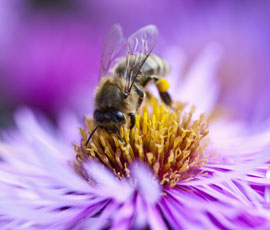Studies blame pesticides for bee decline

Common crop pesticides could be wiping out bee colonies, scientists have warned.
Two new studies have strongly suggested that a class of pesticides, neonicotinoids, which are used to kill sucking insects such as aphids by paralysing their nerves, could be responsible for declining global bee populations.
Scientists in the UK and France who studied bee colonies found neonicotinoids cause the pollen-gathering insects to lose their way home.
A team at Scotland’s University of Stirling, led by Penelope Whitehorn, fed bee colonies with doses of imidacloprid, a neonicotinoid used on maize and oilseed rape. They found an 85% drop in the queen bee population, according to the study, published in Science journal.
“Given the scale of use of neonicotinoids, we suggest they may be having a considerable negative impact on wild bumble bee populations across the developed world,” said Ms Whitehorn, in her study.
“We suggest that there is an urgent need to develop alternatives to the widespread use of neonicotinoid pesticides on flowering crops wherever possible.”
A second study at the National Institute for Agricultural Research in France found that honeybees exposed to thiamethoxam, another neonicotinoid, were more than twice as likely to die outside their hives.
Over the years, a number of reasons have been put forward for the decline in bees, including pesticide use by farmers, which has been linked to bee colony collapse disorder.
Dominic Dyer, chief executive of the Crop Protection Association, said the new research should be considered alongside other factors, such as climate change.
“These two new studies need to be looked at. From our perspective, these products are environmentally sound and are being used in countries where there is no decline in bee populations, for example in Australia.
“We do take stewardship use around these products very seriously. But it’s good technology and its environmentally sound technology and has been proven over a number of years.
“We are not at the point where we believe there would be benefits from removing this technology. We also have to look at the environmental health and climate change.”
DEFRA said the new research did not change the government’s stance on pesticides.
A spokesman said: “The UK has a robust system for assessing risks from pesticides and all the evidence shows neonicotinoids do not pose an unacceptable risk to honeybees when products are used correctly, However, we will not hesitate to act if presented with any new evidence.”
Friends of the Earth’s wildlife campaigner Paul de Zylva said: “This pesticide appears to come with an enormous sting in the tail – a reduction in our precious bee populations.
“Bees are crucial for pollinating our food crops and are a cherished icon of our countryside and gardens – we can’t afford to see their continuing decline.
“Ministers must urgently look at this new research to see if farmers should be allowed to carry on spraying this pesticide in Britain.”

